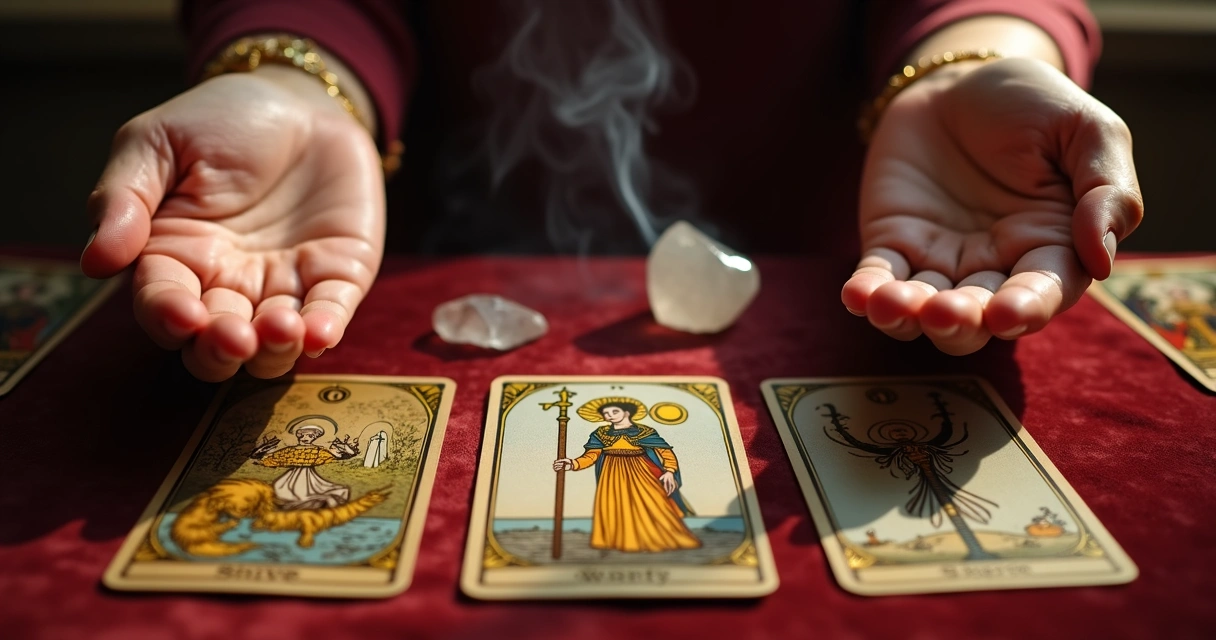When we think about resilience in the world of tarot, the Seven of Wands often stands out, capturing that unique moment when challenge meets self-confidence. This card doesn’t just whisper encouragement; it sometimes shouts for us to hold our ground, even when the odds seem stacked. It carries themes of defense and inner strength—sometimes prickly, often empowering, and always honest.
If you’ve ever pulled the Seven of Wands in a reading, you might have felt a spark, a nudge, or even a moment of uncertainty. What is it really telling us? In our experience as tarot readers and through hundreds of sessions managed within MysticLog, we’ve seen this card shape conversations about self-worth, determination, and what it really means to defend one’s beliefs. In this article, we’ll look closely at its upright and reversed meanings, give practical examples for querents and readers, and share advice on communicating this card’s energy with clarity and sensitivity.
 First impressions: visual cues of the Seven of Wands
First impressions: visual cues of the Seven of Wands
We sometimes overlook the feeling a card gives at first glance. The Seven of Wands nearly leaps from the deck—often showing a lone figure, standing atop a hill, clutching a wand in both hands. Six other wands rise up, pointed threateningly. It’s a tense scene.
Stand your ground even if you feel alone.
Body language here matters. The character is upright, slightly defensive, eyes alert, feet uneven on difficult ground. This signals that victory is never guaranteed—yet effort and resolve are unwavering. The setting’s elevation suggests a hard-won position, while the wands below hint at outside challenges. As with many cards in the suit of Wands, there’s fire, energy, and movement. But with the Seven, there’s also something more persistent: the will to continue.
The upright Seven of Wands: holding your defenses
What does the Seven of Wands mean when it appears upright in a tarot spread? In our research and direct readings, we see it as a clear symbol of resilience in the face of adversity.
- Resilience and endurance: The card often signals a moment when someone must stand tall, push back, and keep fighting for their position or beliefs, even if the crowd against them grows larger or louder.
- Boundaries and self-protection: It is a gentle reminder (or sometimes a loud warning) that personal boundaries matter—this is not the time for passive yeses or shrinking back.
- Conviction: The Seven of Wands is almost stubborn, but that isn’t always negative. Sometimes, only firm conviction keeps us from being swept away in someone else's agenda.
- Healthy confrontation: Contrary to popular belief, this card is not about aggression. Healthy boundaries sometimes require direct, yet respectful, confrontation.
We’ve seen querents pull this card during times of heated debate at work, when facing peer pressure, or when old wounds are challenged in relationships. The upright Seven of Wands doesn’t say the situation will be easy. Instead, it offers the support needed to trust one’s own voice, even when criticism or opposition is inevitable.
You have earned your place. Protect it.
Resilience in action: practical scenarios
Real-life examples help clarify this card’s story:
- Workplace challenges: Imagine someone gets promoted or takes on new responsibilities. They may find others in opposition, questioning their qualifications or approach. The Seven of Wands calls on them to defend their position—fairly and with dignity—rather than back down.
- Personal relationships: In matters of love or family, this card appears when boundaries are tested. Maybe it’s a matter of asserting needs within a long-term partnership or pushing back gently against intrusive friends.
- Spiritual and inner growth: Sometimes, the card addresses an internal battle. Old habits, beliefs, or self-doubts rise up, demanding justification. Here, the Seven reminds us bravery can even be directed inward.
In every upright reading, this card encourages a spirit of persistence, asking us not to yield when something truly matters.
Advice for readers: communicating upright meaning to querents
When this card lands on the table, what should we say? Whether we’re working with seasoned professionals via MysticLog or greeting a first-time querent, tone and language matter. Here’s what we suggest:
- Speak to autonomy: Emphasize the querent’s right to their feelings, opinions, and chosen path.
- Acknowledge effort: Validate the hard work already invested—it takes stamina to reach this point.
- Frame confrontation as healthy: Present opposition as a normal, sometimes necessary aspect of growth, not something to run from.
- Share personal stories: Relating gentle, relevant anecdotes (whether our own, or those from collective tarot wisdom) bridges the gap between abstract card meanings and lived experience.
We often use MysticLog’s AI Assistant to note patterns in how querents respond to the idea of “defending their ground.” This tool can highlight if someone regularly struggles with boundaries or conflict, offering new ways to approach future readings.
 The reversed Seven of Wands: overwhelmed or inflexible?
The reversed Seven of Wands: overwhelmed or inflexible?
When the Seven of Wands shows up reversed, the story changes. Instead of a heroic struggle, the energy tilts toward exhaustion, feeling outnumbered, or, in some cases, being too rigid for one’s own good.
Rest, or you risk burning out.
A reversed Seven can point to a time when boundaries are crossed or simply too weak to hold. Querents may feel overwhelmed by opposition or doubt their worthiness to defend themselves. In our practice, some of the clearest signals of this card reversed include:
- Fatigue and doubt: Feeling tired from constant vigilance, unsure if the fight is even worth it.
- Over-adaptation: Caving to pressure or opinions, losing sight of personal convictions.
- Isolation: Sometimes, the defense has been up so long that others stop trying to connect at all. Inflexibility can wall us off from support.
How to approach a reversed Seven in client readings
Communicating about vulnerability takes sensitivity. Here’s how we often discuss this card when working through MysticLog’s reporting tools and one-on-one readings:
- Encourage rest: Suggest time away from point of conflict, or from people who continually push boundaries.
- Ask reflective questions: “Whose expectations are you defending?” or “When is it okay to ask for help?”
- Re-examine boundaries: Sometimes boundaries are too porous, but sometimes they’re too high. This card encourages honest self-assessment, not just dogged defense.
We think the nuance here matters greatly, especially for querents prone to overworking, people-pleasing, or shutting others out defensively.
You don’t have to fight every battle to win the war.
Symbolic roots: what the Seven of Wands represents
Wands as a suit reflect human will, ambition, and the creative drive. In the cycle of Wands, after the spark of the Ace (read about the Ace’s meaning here), and the competitions and tensions of the Five (study the Five of Wands here), the Seven presents a more individualized challenge.
It is not the chaos of open conflict, but the act of defending what has already been won—sometimes a hard task as it takes constant attention. The number seven in tarot often brings spiritual or philosophical overtones, suggesting reflection, introspection, and sometimes spiritual tests.
The Seven of Wands is like a personal checkpoint: “Will you defend your truth, even if no one else agrees?” It does not ask for recklessness, but for steadiness and self-trust. The card encourages us to face resistance not as a threat, but as a chance to clarify priorities. That clarity sometimes comes at a cost, yet it forges inner strength.
 How to empower querents: guidance for psychic professionals
How to empower querents: guidance for psychic professionals
To us, the message of the Seven of Wands is never about fear. It is about supporting clients or students as they recognize when to stand up and when to rest.
- Validate experiences: A client feeling pressured may need assurance that it’s normal to feel defensive when boundaries are under threat.
- Develop action steps: Instead of simply describing the card, help your querent visualize what standing firm looks like in their world. This might mean rehearsing assertive phrases or listing tangible ways to protect their time and energy.
- Balance the energy: Offer perspective—sometimes, a hard fight wins respect, but sometimes, choosing which battles matter most protects well-being.
- Link to other tools: For psychic professionals using MysticLog, consider storing reading notes where recurring boundary challenges surface over time. This helps you offer more tailored guidance in future sessions.
We think that the reflection process itself is as useful as the advice. If querents see patterns—like always defending against specific people or always afraid to speak up—then further self-inquiry is naturally sparked. Referencing resources such as a library of tarot card meanings can deepen client insight in preparation for their next reading.
Practical self-reflection
For tarot learners, the Seven of Wands offers a chance for self-examination. Try journaling with prompts like:
- When have I fought for something I believed in, and what outcome did that bring?
- Can I think of a time I set a boundary and how it changed my relationships?
- Do I tend to give in to conflict, or do I hold my ground—even to my own detriment?
These prompts help students move beyond rote memorization and toward transformative self-awareness. You’ll find more exercises like this in our reflection and growth guide, which is a useful complement to MysticLog's structured digital journaling.
Seven of Wands in different life areas
Let’s illustrate the Seven of Wands meaning through the lens of the everyday.
In relationships
When this card comes up regarding romance or friendships, it’s almost always a sign that one or both people are feeling defensive. This could be because old patterns are resurfacing, or maybe someone is feeling threatened by outside influence. The advice? Speak honestly, honor your boundaries, and resist the urge to win every argument. Sometimes the real battle is with ourselves, letting go of the need to prove a point.
Career and professional life
In work questions, the card is classic for those feeling isolated at the top, perhaps after earning a promotion or voicing an unpopular, but necessary, idea. This is not a sign to step down—it’s encouragement to stay true, especially when you know your intentions are pure. The key is to balance drive with diplomacy, advocating for yourself while remaining open to feedback.
Spiritual growth and self-discovery
For those on a journey inward, the Seven of Wands signals a moment where your newly-formed beliefs might be tested by old doubts or by those around you. This is healthy confrontation with the self. The real reward isn’t just “winning,” but knowing what’s worth defending and letting the rest slide.
If you’re interested in tarot’s personal-growth potential, our self-discovery guide provides more on this, weaving the wisdom of cards like the Seven of Wands into practical daily reflection.
Conclusion: carrying the Seven of Wands forward
In our working with tarot, we see the Seven of Wands as a card that challenges—sometimes confronts—but always wants to uplift. Resilience is not about never stumbling, and boundaries are not unbreakable walls. This card teaches us to stand up when it matters, rest when needed, and stay true to ourselves even when the world pushes back.
Your convictions deserve protection.
As you deepen your own tarot journey, don’t hesitate to anchor your practice with a digital ally. With MysticLog, not only can you track these turning points, but you can also revisit them, sharpen your interpretations, and help your clients thrive. Let us help you organize, reflect, and grow. Try MysticLog today—because your insights are worth defending and remembering.
Frequently asked questions about Seven of Wands
What does the Seven of Wands mean?
The Seven of Wands is a tarot card symbolizing resilience, standing up for oneself, and maintaining personal boundaries amid opposition or challenges. It asks the querent to defend what truly matters, persevere when tested, and not give up their ground too easily. This card often appears when one is feeling pressured by external forces and must summon the courage to hold their position.
How does Seven of Wands show resilience?
This card shows resilience by depicting a figure who doesn’t back down, even when outnumbered or under stress. The message is clear: keep fighting for your beliefs or achievements, trust your ability to overcome obstacles, and see adversity as an opportunity to strengthen your resolve. The upright position calls for active, ongoing self-defense, while the reversed position may highlight times when resilience feels worn thin or needs renewal.
What situations suit the Seven of Wands card?
Situations involving conflict, competition, needing to assert boundaries, or defending new roles are common when this card arises. In relationships, it can relate to standing up for your needs; at work, it may involve defending your ideas or status; on a spiritual level, it can mark periods when you are challenged to hold on to new beliefs against old patterns. The Seven of Wands offers support during “high-pressure” moments where standing strong is required.
How does Seven of Wands relate to boundaries?
The Seven of Wands relates closely to boundaries because it calls attention to times when those boundaries are being tested or threatened. It represents both the need to establish healthy personal limits and the courage to communicate them, even when uncomfortable. Whether upright (defending boundaries) or reversed (learning to soften or reinforce them), this card reminds us that boundaries protect our energy, values, and self-worth.
Is the Seven of Wands a positive card?
While it may indicate ongoing challenges or confrontation, the Seven of Wands is ultimately positive in what it inspires: resilience, courage, and self-assertion. It teaches that lasting growth comes through defending what matters most, encouraging both persistence and wise discernment. In our practice, we see it as a gentle but firm encouragement to honor yourself, regardless of outside pressure.




